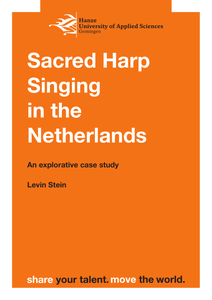This study employed an exploratory approach by applying practice theory to insights gathered throughthe triangulation of interview, document analysis and observation methodologies to 1) map the SacredHarp Singing practice scope and give a nuanced picture of its performativity in the Netherlands, witha particular focus on the Sacred Harp group from Amsterdam comparing it to one from Bremen and 2)investigate the underlying rise of transformative emotions, the social, secular, and religious meanings, andthe sense of belonging to an international community. The findings suggest that Sacred Harp enthusiastsin the region are keen on retaining the legacies of the traditional singers by establishing similar singingatmospheres and by following the practice’s historical customs and practices, including the communalsinging in the “hollow square” and the affinity towards democratic participation. The findings alsoindicate that while there is a noticeable level of commitment and excitement among local enthusiasts,the growth of the groups’ memberships is hampered by a lack of interest by the general public, possiblyin connection with insufficient strategies for publicizing the practice. Therefore, the existence of thesebarriers could imply that the practice would probably grow at a relatively slow pace in the region.
DOCUMENT

Sacred Harp komt voort uit de Amerikaanse protestants-christelijke koormuziek en beleeft sinds enige decennia een revival buiten de kerk om. Levin Stein onderzocht bij zanggroepen in Amsterdam en Bremen wat mensen beweegt om zich over te geven aan deze muziek. Zijn conclusie is dat ze in de muziek een tegenwicht vinden voor de geprofessionaliseerde, vervreemde, op het individu gerichte en seculiere westerse cultuur. Sacred Harp biedt hun een alternatief: gelijkwaardigheid, authenticiteit, gemeenschap en spiritualiteit. Sacred Harp is geen expliciete protestcultuur, maar creëert een van de dominante cultuur losstaande plek waar mensen elkaar ontmoeten die zich herkennen in alternatieven zonder dat ze de dominante cultuur expliciet bestrijden. Dit wordt vooral duidelijk in de ontwikkeling van een interessante relatie tot geïnstitutionaliseerde religiositeit door het zoeken naar een onafhankelijke spiritualiteit.
LINK